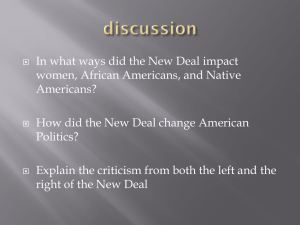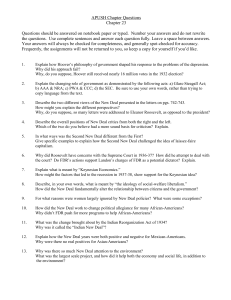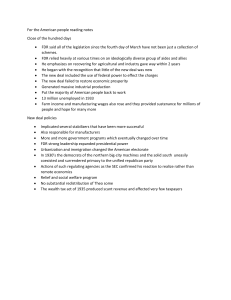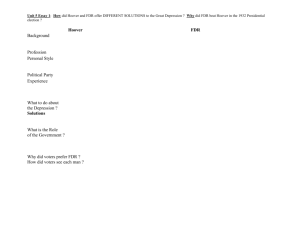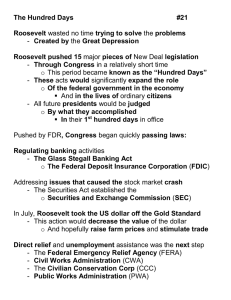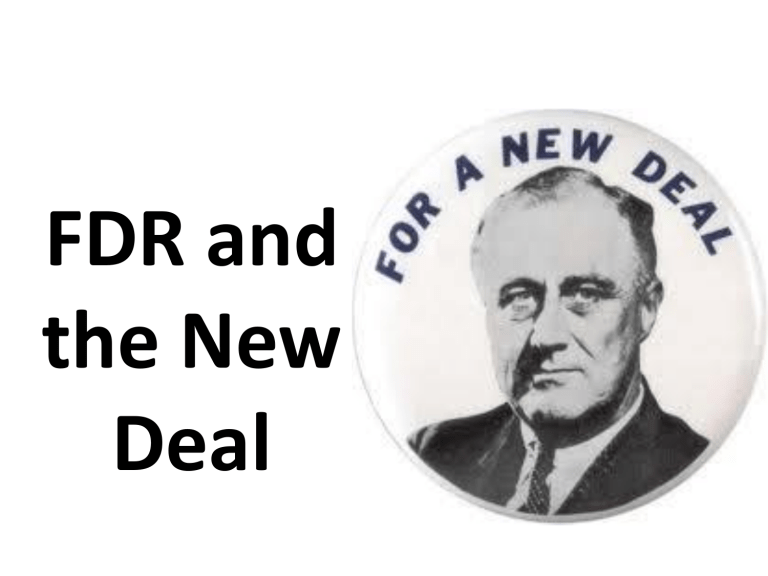
FDR and the New Deal The Bonus Marchers • In May of 1932, about 1,000 WWI veterans began to march toward Washington DC. to try and pass legislation to have their bonuses paid early • They called themselves the Bonus Expeditionary Force… • The public called them the Bonus Army • They were supposed to receive $1,000 in 1945…but they needed it now • As they passed towns more veterans joined in. • They wore their old military uniforms and sang war songs. • Their numbers grew to about 17,000. This was known as the Bonus Army. • Totaled 43,000 marchers including their families and supporters • They found places to stay in shantytowns or abandoned buildings. • Camps were very organized… "We Done a Good Job in France, Now You Do a Good Job in America" 5 Donations for the Bonus Army Bonus Marchers continued House passed the vote to give them $, Senate rejected it, and things grew more tense President Hoover ordered them to leave. The police were first responsible for making them leave…two protesters are killed… Federal Army called in to restore order… Two veterans were shot and killed... MacArthur leads the Calvary on horses, Patton leads the tanks, Eisenhower is liaison with the police They began to tear gas the crowd until everything calmed down. A women and her two babies die The mishandling of these WWI veterans would tarnish Hoover’s image forever. MacArther Patton • This request was shot down by the Senate with a vote of 6218. Most of the Bonus Army went home at that point, aided by Hoover’s offer of free rail transportation. Ten thousand men remained behind. On the morning of July 28, forty protesters tried to reclaim an evacuated building in downtown Washington scheduled for demolition. The city's police chief, Pellham Glassford, sympathetic to the marchers, was knocked down by a brick. Glassford's assistant suffered a fractured skull. When rushed by a crowd, two other policemen opened fire. Two of the marchers were killed. At this point, the District of Columbia asked for federal troops to preserve order. Hoover agreed and enlisted the help of Major General Douglas MacArthur, who basically burned down the entire shantytown where the Bonus Army was living in. Two children and their mother were killed. Bonus Army Brick Throwers 8.6 Life of FDR • He grew up on the Hudson River at his families estate in Hyde Park NY. • He married a distant cousin named Eleanor Roosevelt. • Teddy Roosevelt was Eleanor’s Uncle, and stood at her wedding in the place of her father • He served as assistant Secretary of the Navy throughout WWI. • He got Polio at age 39. This disease would permanently paralyze his legs. • Elected 4 times (4 times total: 1932, 36, 40, and 44) FDR in 1893 1 of only 2 only known photographs of him in a wheelchair Franklin with Eleanor/ Secretary of the Navy Sad Marriage • FDR had an affair with Eleanor’s secretary early in their marriage • Nicknamed “Mrs. Johnson” by secret service • Eleanor offered a divorce so that he could be with the women he loved • He promised not to see her…liar • They remained married, but all love was gone • Marriage was political partnership…not love Lucy Mercer Together in Hyde Park FDR and the New Deal • Franklin Delano Roosevelt (D) won the 1932 election vs Herbert Hoover • Franklin Roosevelt (FDR) is a distant cousin of Teddy Roosevelt. • FDR was serving as governor of New York state. • He created the “New Deal” which aimed at economic recovery – Relief – Recover – Reform • “Throughout the nation men and women, forgotten in the political philosophy of the Government, look to us here for guidance and for more equitable opportunity to share in the distribution of national wealth... I pledge myself to a new deal for the American people. This is more than a political campaign. It is a call to arms.” Democrats lay the smack down in 1932 Electoral votes: 472 -- 59 FDR takes over in troubled times • March 4th, 1933 – Roosevelt takes office (33 days after Hitler becomes Chancellor of Germany • Benito Mussolini has already taken control of Italy • 25% of population is unemployed • 2 million are homeless • Industrial production cut in half from 1929 • price of farming crops are down 60% • America is in the worst economic situation it had ever been in Americans were anxious to see what FDR would do once he took over. He needed the people’s confidence. FDR wanted to end prohibition immediately Inauguration Address “the only thing we have to fear, is fear itself.” First Hundred Days in Office • FDR picked advisers with many different view points so he could weigh everything equally and make a sound decision. • When he took office there was an immediate bank run and over 4,000 banks collapsed (scared the same thing would happen when Hoover was elected) • On the second day he was in office, he declared a national bank holiday which closed all banks and gave him time to make changes to the banking system • He would make radio speeches to the public known as “fireside chats.” These talks helped restore confidence. • He would begin with “Hello friends” and they became more popular than any of the famous shows during this “Golden Age of Radio” • During this time Congress passed 15 acts to help the crisis of the Depression. • These Acts are what is known as the New Deal. FIRST FIRESIDE CHAT Carl Carmer, April 1945 regarding FDR’s Fireside Chats “I never saw him, but I knew him. I can never forget how, with his voice, he came into our house, the President of the United States, calling us friends…” Examples of the New Deal 1. The Emergency Banking Relief - This issued Treasury Department licenses to banks 2. Securities and Exchange Commission (SEC) - Regulated the stock market and prevented fraud 3. Federal Deposit Insurance Corporation (FDIC) - Provided government insurance for bank deposits up to a certain amount 4. Agricultural Adjustment Administration (AAA) - Gave money to farmers not to grow certain crops to raise demand 5. National Industrial Recovery Act (NIRA) - Allowed business and government to set up rules for each industry Examples of the New Deal part 2 6. Civil Works Adminstration (CWA) • Employs people in the raking leaves cycle…selfesteem 7. Farm Credit Administration (FCA) - Helped farmers refinance their mortgages 8. Civilian Conservation Corps (CCC) - Gave young men age 18-25 jobs outdoors jobs like building parks 9. Tennessee Valley Authority (TVA) - Created dams and reservoirs that were used to provide electricity in rural areas 10. Great Smokey Mountains Second New Deal • Some of the Second New Deal policies were: 1. Works Progress Administration(WPA) -- Biggest New Deal program -- Spent 11 billion fixing streets, bridges, airports, and parks 2. Committee for Industrial Organization - Organized industrial unions 3. Social Security Act - Provides money for elderly people when they retire - People could begin collecting at age 65 WPA Construction Workers WPA Sewing Shop The most controversial part of the WPA was the hiring of artists, playwrights, orchestras, and journalists. WPA Artists 90% of WPA work went to unskilled labor…but artists were also hired for propaganda purposes (and to give work) WPA Propaganda WPA Park Photographer WPA Art Mural WPA-made art poster Fair Labor Standards Act of 1938 • This provided the first federal minimum wage at 25 cents an hour and provided more protection. • This was the LAST MAJOR piece of New Deal legislation • Republicans won back many seats in Congress and by 1939 the New Deal was over. • FDR began to focus more on world issues rising out of Germany and Europe. • Indian Reorganization Act- gave back sacred Native American lands PWA dam in Montana gave work to over 10,000 workers CWA making a scenic highway in California…look how many workers Civilian Concervation Corps (CCC) TVA got water to the rural areas NEW DEAL BEGINS RECESSION Of 1937 New Deal cont… • The New Deal showed how FDR was willing to help America. • Jobs were created, people got to keep their homes, and farmers went back to work. • This plan helped to restore American’s faith in the government. • Things were still rough in America…but seemed better • What FDR did best? • THE NEW DEAL CHANGE THE SPIRIT OF AMERICA…PEOPLE HAD HOPE AGAIN… My Grandmother and FDR LEGACY OF THE NEW DEAL • Only moderately successful • We wouldn’t fully get out of the depression until after WWII • Increased the role of the federal government incredibly—and this debate still goes on today • BUT it did instill faith in the lower classes that the federal government would help them when they need it • NATIONAL DEBT!!!!!!!! Criticism of the New Deal • Roosevelt began deficit spending by borrowing money to pay for his programs. • Others believed that FDR had turned the US into a socialist country Court-Packing Plan • Roosevelt called the Supreme Court “nine old men.” • FDR’s idea was to increase the number of justices. If a justice did not retire at the age of 70, the President could appoint another justice to serve. • This idea was cancelled in Congress but made the Supreme Court realize it needed to work more closely with FDR. Your Assignment: You are President Roosevelt. Together with a partner I want you to write your own Fireside chat. Your goal is both INFORM AND INSPIRE HOPE regarding New Deal Programs and Initiatives. Your talking points include: -- Social Security -- CCC -- TVA -- WPA -- FDIC -- Fair Labor Standards Act
